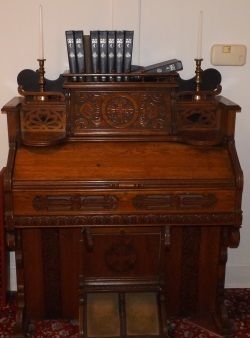The Melodeon

The following is taken from an article that was printed in the London Enterprise, the forerunner of the Madison Press, on Friday, October 17, 1930. The article traces the history of Methodism in Madison County, written by Mrs. Hasel H. Beach. This article humorously points out the difficulty the organ had in making its way into our church. This is in marked contrast to the important place the organ enjoys in our worship today.
THE FIRST MUSICAL INSTRUMENT IN THE LONDON M. E. CHURCH
“So far as I am informed, no musical instrument was employed in the services of the London Methodist Episcopal Church until somewhere around (1870), prior to that time the hymns were led by what were considered good singers, and this lead was at once taken up by the general congregation.
Entering the church one Sunday morning I observed a very small box-like concern standing just in front of the altar on the rostrum that I at once recognized as a melodeon (I had been acquainted with one of the breed for a few years).
At the proper time the pastor informed us that the box was a melodeon, and that it might be of service in assisting the singers. After explaining the advantages of the stranger, he asked who would be the first to donate $5 towards the purchase of the instrument.
THE FIRST MUSICAL INSTRUMENT IN THE LONDON M. E. CHURCH
“So far as I am informed, no musical instrument was employed in the services of the London Methodist Episcopal Church until somewhere around (1870), prior to that time the hymns were led by what were considered good singers, and this lead was at once taken up by the general congregation.
Entering the church one Sunday morning I observed a very small box-like concern standing just in front of the altar on the rostrum that I at once recognized as a melodeon (I had been acquainted with one of the breed for a few years).
At the proper time the pastor informed us that the box was a melodeon, and that it might be of service in assisting the singers. After explaining the advantages of the stranger, he asked who would be the first to donate $5 towards the purchase of the instrument.
Now the Bible had not provided for melodeons in the church, and the stir among the congregation seemed to indicate a somewhat general objection to introducing it, “Fiddling" on Sunday had been often denounced from the pulpit and most of the elderly people present appeared to look upon such a thing as a melodeon as an aggravation of even the "fiddle".
The leading singers, particularly, were not well impressed with the idea. Finally, under the plea of the pastor, one courageous albeit benighted elderly brother said he would subscribe $5.
As this good brother was well known to be always ready to subscribe, but eternally slow to make his subscription good, his readiness failed to create the enthusiasm desired by the pastor. But the next subscription was undoubtedly good, and a faint hope was manifested, at this juncture an elderly father in Israel Christian Slagle (George Clark's grandfather).
One of the best singing leaders arose in wrath and sternly announced that he would give $5 if they would throw the unhallowed thing out the window. This was great encouragement to the leading singers, although it was well known that the throw-it-out-the-window brother played the "fiddle" six days out of the week, and that his daughter was taking lessons on a melodeon similar to the one put up for sale. But there was no mystery here, as everybody whose opinion was worth anything knew very well that the "fiddle", the Melodeon and such things were all right on a week-day but were invested with some sort of a satanic influence on Sunday. All the leading singers believed in this implicitly. But the congregation was not asleep, and began to suspect that the leading singers were fearful that their occupation was threatened. This decided the matter and the melodeon was purchased.â€
The leading singers, particularly, were not well impressed with the idea. Finally, under the plea of the pastor, one courageous albeit benighted elderly brother said he would subscribe $5.
As this good brother was well known to be always ready to subscribe, but eternally slow to make his subscription good, his readiness failed to create the enthusiasm desired by the pastor. But the next subscription was undoubtedly good, and a faint hope was manifested, at this juncture an elderly father in Israel Christian Slagle (George Clark's grandfather).
One of the best singing leaders arose in wrath and sternly announced that he would give $5 if they would throw the unhallowed thing out the window. This was great encouragement to the leading singers, although it was well known that the throw-it-out-the-window brother played the "fiddle" six days out of the week, and that his daughter was taking lessons on a melodeon similar to the one put up for sale. But there was no mystery here, as everybody whose opinion was worth anything knew very well that the "fiddle", the Melodeon and such things were all right on a week-day but were invested with some sort of a satanic influence on Sunday. All the leading singers believed in this implicitly. But the congregation was not asleep, and began to suspect that the leading singers were fearful that their occupation was threatened. This decided the matter and the melodeon was purchased.â€
